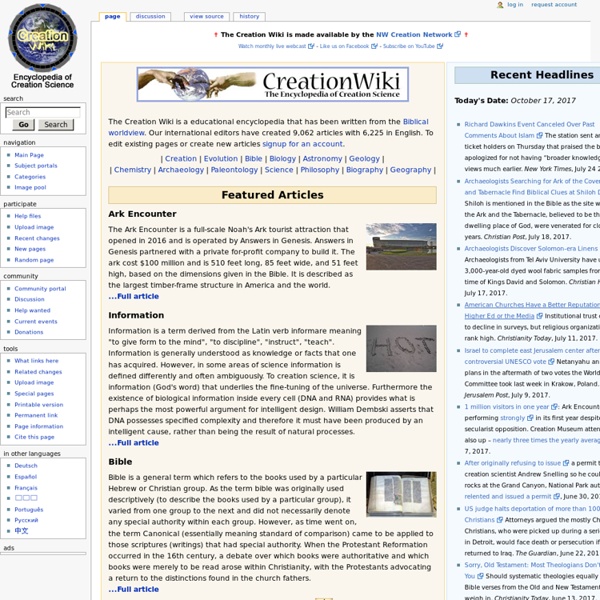



http://creationwiki.org/Main_Page
Creation Science Landover Baptist Subject Archives Update: Landover Baptist is proud to announce that Jesus ordered us to rename our 100-year old facility, The Landover Baptist Center for Creation Studies, to The Sarah Palin Center for the Advancement of Creation Science Research. "Mrs. Palin shares our belief that the world was created by Jesus' Daddy, Poppa-God, in six days but has been here for 6,000 years. That alone is enough to ensure she has the vote of every single member of this church and no doubt the vote of every True Christian™ American," said Pastor Deacon Fred. "If you couple all of this with her Evangelical Republican zeal, her savvy new spin on traditional family values, and well kept knees, it is enough to give REAL fundamentalists like me great hope that she will lead America backwards to the wonderful Christian principles upon which our Nation was founded. Praise God!"
Scientific Facts in The Bible Also See Scientists are now finding that the universe in which we live is like a diamond studded Rolex, except the universe is even more precisely designed than the watch. In fact, the universe is specifically tweaked to enable life on earth. Anthropic Principles Contrast the information on this page with the scientific knowledge of the Qur’an. Analyzing Tisdall here is a clip from a debate between Laurence Tisdall (creation scientist) and Jason Wiles (evolutionary biologist). Now in this debate, Tisdall supposedly "disproves" evolution. He has even written a book "how to debate an evolutionist and never lose". In the Beginning Compelling Evidence for Creation and the Flood - index.html About This Site The 8th Edition of In the Beginning: Compelling Evidence for Creation and the Flood by Dr. Walt Brown is available to order here. It can also be read or printed out at this website; just use the links at the left to navigate through the outline of the entire book. The 8th Edition was published in December 2008.
The 16 Best Apologetics Podcasts Over three years ago I posted my 16 Best Apologetics Podcasts. That list has changed a bit since then, updated twice along the way. Here's the new, updated list. (Previous version October 4, 2010; most recent update June 23, 2011). 1. Reasonable Faith - William Lane Craig - iTunes | Feed 2. Créationnisme “La preuve paléontologique suffit à imposer la théorie de l'évolution.” “Rien dans la biologie n'a de sens si ce n'est à la lumière de l'évolution.” Le créationnisme est une théorie religieuse et métaphysique sur l'origine de l'univers. Ce n'est pas une théorie scientifique.
Lesson 2 - Are the FOOD LAWS Scientific? f "nothing is unclean of itself" (Rom.14:14), should we consume canned RATTLE SNAKE and FROG'S LEGS? If "every creature of God is good, and nothing to be refused" (1 Tim.4:4), shall we eat ESCARGOT (SNAILS) and WHALE BLUBBER? Did Peter's vision (Acts 10) somehow cleanse CAVIAR, CLAM CHOWDER and chocolate covered ANTS? Were the prohibitions on PIGS and RABBITS merely temporary, ceremonial rituals until "the cross of Christ," or are there scientific, health principles involved in avoiding these unsanitary creatures? Which Plants Are Edible? Before we investigate the animal kingdom, the Bible has something to say about which plants are edible. Popular Myths About the Bible Well, perhaps there's another view that we can examine by looking at Scripture. Remember, Jesus was a Jew and the Jewish Sabbath is Saturday; Christians are the ones who observe Sunday as Sabbath. Jesus made a direct, prophetic statement concerning His death: "FOR AS JONAH WAS THREE DAYS AND THREE NIGHTS IN THE WHALE'S BELLY; SO SHALL THE SON OF MAN BE THREE DAYS AND THREE NIGHTS IN THE HEART OF THE EARTH" (Matthew 12:40 KJV). So, Jesus may have been crucified Wednesday and arose on Saturday: Wednesday - 6pm - Burial & Night 1 Thursday - Day 1 & Night 2 Friday - Day 2 & Night 3 Saturday - Day 3 Jewish Sabbath* *The Jewish Sabbath is not so much a day as a period of time.
Inquiétante offensive des créationnistes américains La bataille fait rage, aux Etats-Unis, entre les défenseurs de la théorie de l'évolution conçue par Charles Darwin et ceux qui veulent introduire dans les programmes scolaires la notion de "dessein intelligent". Les professeurs peinent à résister à la pression des parents et de l'opinion publique LE MONDE | • Mis à jour le | Par Corine Lesnes - New York de notre correspondante Pennsylvanie, Kansas, Géorgie... La liste s'allonge. Welcome - Learn more about Father Yahweh's Creation (Applied Bio The invention relates to a method, with which it becomes possible to activate inorganic materials in such a manner that with the inset of these materials on the fields of the agriculture and environmental protection favourable effects are obtained. With the inset in the agriculture z becomes. B. the growth of plants and their root formation affects favourably. In the range of environmental protection it is possible, biological expiration operational sequence z. B. to support during the humus production, as a faster and better rotting of the Kompostiergutes takes place.
The Christianity Map Check out this map of the geography of Christianity in the United States. It’s one of a series of mind-blowing maps prepared by the brilliant cartographers behind the site FloatingSheep. The geographic pattern is striking. “Catholics are most visible in much of the Northeast and Canada, with Lutherans taking the Midwest, Baptists the Southeast, and Mormons unsurprisingly taking much of the mountain states. Resource Pages for Biblical Studies, main page This page contains links to biblical texts and various other texts related to the Bible, and especially to the New Testament. Greek and Hebrew texts, and various translationsRead more » Works in Greek and Hebrew and translationsRead more » Various Palestinian textsRead more » Various texts from the second century on.Read more »